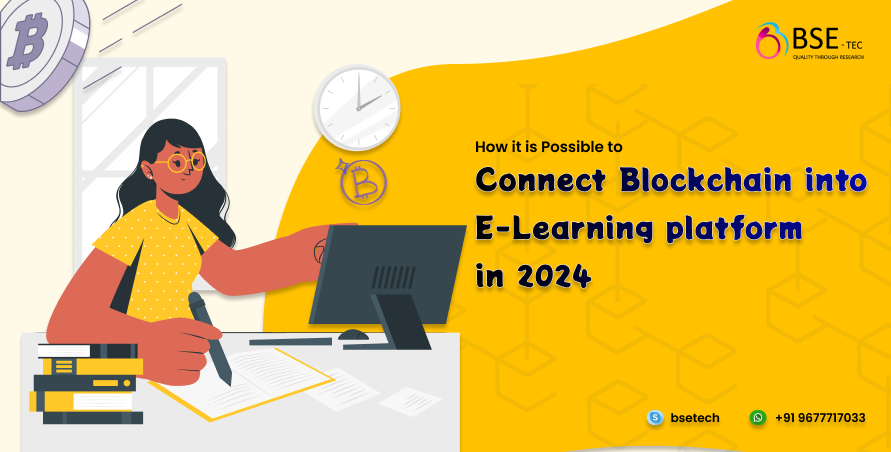How it is Possible to Connect Blockchain into Elearning Platform in 2024

In recent years, the convergence of technology and education has led to revolutionary changes in how we learn and interact with knowledge. As we set foot in 2024, blending blockchain technology into e-learning platforms promises to remodel and improve the educational landscape. Let us explore how this integration is possible and its numerous benefits.
Blockchain Key Concepts
Before diving into the integration process, it’s essential to understand what blockchain is. Blockchain is a decentralized digital ledger that records transactions across many computers to ensure the records cannot be altered retroactively. This technology has gained fame through cryptocurrencies like Bitcoin, but its applications extend far beyond finance, especially in education.
As we look at the evolving landscape of education technology in 2024, integrating blockchain into an eLearning platform like ExpertPlus LMS presents a fascinating opportunity to enhance visibility, accountability, and engagement in online learning. Here is how it is possible to connect blockchain to eLearning platforms meaningfully.
Where Blockchain can be used in E-learning
One of the most compelling reasons to integrate blockchain into ExpertPlus LMS is the ability to provide secure, unverifiable credentials. Institutions can issue verifiable digital certificates and diplomas for completed courses Using blockchain technology. This would involve:
- Creating a digital wallet for learners to hold their certificates – Storing the credential on a blockchain, allows employers to verify it through a simple scan or link.
- Decentralized Student Records – Blockchain can facilitate the storage of learner’s records in a decentralized manner, giving students greater control over their data by developing a user-friendly interface where students can log in to view their records.
- Blockchain to ensure that records are immutable and securely stored.
- Smart contracts can automate and streamline various administrative processes. These contracts could handle tasks.
- Automating enrollment processes based on payment confirmations.
- Facilitating conditional rewards, such as unlocking advanced courses based on performance metrics.
- Incorporating a token economy, ExpertPlus LMS can reward engagement, completion, and collaboration.
- Token issuing for completing courses or participating in discussions.
- Students can redeem tokens for discounts, exclusive content, or additional courses.
Successfully integrate blockchain technology into an E-Learning platform
This is the following steps should be considered:
Step 1: Choose the Right Blockchain Platform. Select a blockchain framework that aligns with the requirements of the LMS.
Popular options may include Ethereum for its smart contract capabilities.
Hyperledger for enterprise-level control and privacy Solana for speed and scalability.
Step 2: Develop a Comprehensive Integration Plan on how blockchain will work within the existing framework of ExpertPlus LMS. This plan should include:
The aspects of the LMS that will utilize blockchain (e.g., credentialing, student records).
The data flow and interactions between the eLearning platform and the blockchain.
Step 3: Create a User-Friendly Interface so that the integration does not complicate user experience.
Design simple onboarding processes for students to understand their blockchain wallets.
Step 4: Focus on Compliance and Security for the sensitivity of educational data, it’s crucial to maintain compliance with local regulations:
Ensure that student data is secured and privacy policies are in place.
Consult with legal experts to navigate regulations like GDPR or FERPA if applicable.
Step 5: Pilot Testing and Feedback Before a full rollout, conduct a pilot test for blockchain features with a smaller group of users.
Gather feedback on usability and functionality “BSEtec can make adjustments based on user experiences and concerns along with expertplusLMS – inspired from Udemy Clone”.
How Blockchain Can Transform eLearning
- Secure Credential Verification: One of the most significant challenges in education is verifying credentials. Blockchain can provide a safe, tamper-proof way to store and share academic credentials. Institutions can issue digital diplomas and certificates on the blockchain, making it easy for employers and other institutions to verify qualifications without the risk of fraud.
- Decentralized Learning Records: Traditional eLearning platforms often rely on centralized databases which can be vulnerable to hacks and data breaches. Blockchain allows learners to have control over their educational records. They can manage achievements, assessments, and certifications in a distributed network, Through decentralized methods that strengthen data reliability and safety.
- Smart Contracts for Course Access: Smart contracts on the blockchain can automate administrative processes in eLearning. For example, if the student pays for a course, a smart contract can automatically grant them access to the course materials and modules, eliminating the need for manual enrollment processes.
- Tokenization of Learning: Blockchain enables the creation of a token-based economy within eLearning platforms. Educators can issue tokens as rewards for completing courses, participating in activities, or contributing to the learning community. These tokens can be used for exclusive content or future courses.
- Incentivizing Collaboration and Peer-to-Peer Learning: Integrating blockchain, eLearning platforms can encourage collaboration through decentralized peer-to-peer education models. Learners can contribute knowledge, share resources, and earn tokens or rewards for tutoring others, creating a more engaged and participative learning environment.
- Enhanced Traceability and Transparency: Blockchain provides a transparent record of all transactions and interactions on the platform. This traceability can benefit both learners and educators by providing insights into learning patterns, course effectiveness, and areas for improvement.
The fusion of blockchain technology with eLearning platforms is not just a futuristic notion—it’s a reality that is becoming increasingly feasible in 2024. By enhancing security, increasing transparency, and creating more personalized learning experiences, blockchain has the potential to address many of the current challenges faced by traditional education systems.
As educational institutions and eLearning providers continue to innovate, those who embrace blockchain technology will likely redefine how we learn, validate knowledge, and empower individuals in their education journeys. The future of eLearning is here, and it’s built on the principles of blockchain! Get connected with BSEtec – A leading blockchain development company.
Did you find this article useful? Let us know by leaving a comment below, or join us on Twitter and Facebook.




